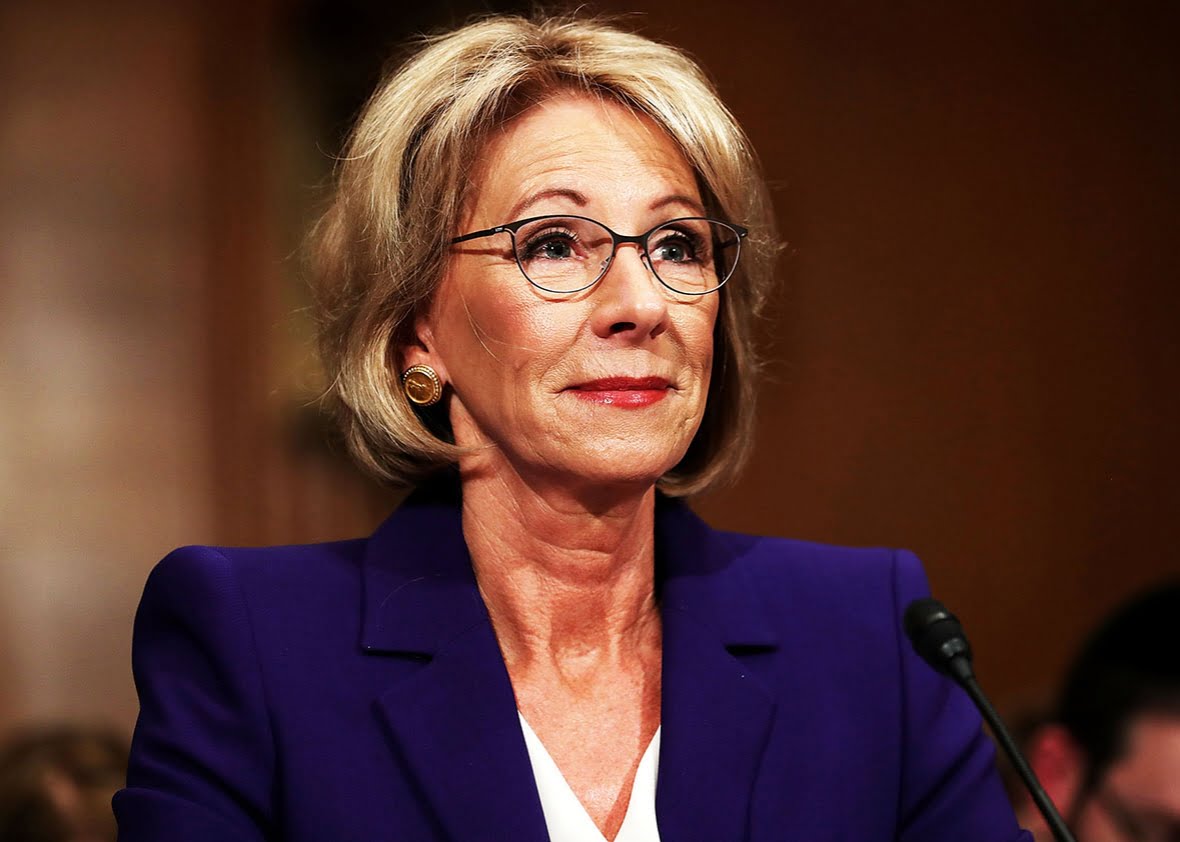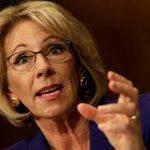
Of all Betsy DeVos’ stated priorities as America’s presumed next education chief—and there have not been very many—her desire to let parents pick the best schools, public or private, for their children remains one of the most consistent and emotionally resonant.
At her confirmation hearing on Tuesday, Trump’s nominee for secretary of education told senators: “My orientation is around parents and children. When parents choose charter schools, they are doing so because they think it’s a great choice for their children.” “Parents,” she said, “no longer believe that a one-size-fits-all model of learning fits the needs of every child.” If you have a kid in school, that’s an easy sentiment to nod to. It’s also, if it’s poorly applied, an outdated and potentially destructive one—especially, the evidence tells us, when it comes to educating the children of lower-income families.
DeVos is sounding an old tune in her insistence on the power of parental choice as a lever to improve education in America. In the late 1980s and early 1990s, the notion became a rallying cry for conservatives—and some liberals—eager for states to embrace private school voucher programs, charter schools, or both. (Charter schools are public-private hybrids that typically must follow the reporting requirements of traditional public schools, including test scores and graduation rates. Voucher programs, by contrast, divert public funds—often in the form of “tuition vouchers”—to private schools that lack the regulations and transparency of public ones. Charter schools generally garner more bipartisan support than voucher programs, but several Democrats, particularly black ones, have endorsed vouchers as a potential boon for low-income families of color.)
Although DeVos’ exhortations on behalf of parental school choice are familiar to anyone who follows education reform, today she is wildly out of touch with a large part of the movement she purports to represent. The nearly 30-year history of school vouchers and charters in America has shown that parental choice—in the absence of government intervention—will not improve the quality of education in America and could inflict significant damage on the poorest communities. Indeed, even many of the staunchest early supporters of unchecked parental choice have moderated that stance over the past 15 years. By all appearances, DeVos hasn’t faced a similar moment of reckoning.
Howard Fuller, an early and well-known supporter of school vouchers who founded Marquette University’s Institute for the Transformation of Learning, has long advocated for providing poor parents with more educational options. He still believes strongly in the power of school choice. Yet based on experience and evidence, he came to see the need for a greater governmental role—either direct or delegated—in determining which schools can open and which ones should close. “The free-market ideas upon which the voucher program was founded—that academically superior schools will thrive because parents will choose them over lousy schools—has not been borne out over the past two decades,” Fuller was paraphrased as saying in a 2011 Milwaukee Journal Sentinelarticle.
DeVos, for her part, does not appear to be listening. In word and in deed, she continues to support an ideological free-market approach to school choice where taxpayer dollars follow students directly to public schools, charter schools, virtual schools, private schools, home-based schools, and a host of other options. This is exactly the system she has spent tens of millions of dollars supporting in Michigan, where her forceful, and well-financed, advocacy has helped leave the state with one of the most permissive, unregulated charter school laws in the country—and poor outcomes to show for it.
The nation’s oldest and largest urban school voucher program is in Milwaukee, and the city offers one of the best case studies for how unfettered educational free markets play out on the ground. (I covered education issues, including vouchers, for the Journal Sentinel between 2002 and 2007.)
Milwaukee’s program historically targeted low-income families, allowing them to use state-funded tuition vouchers to send their children to private schools and, as of 1998, religious ones. When I started reporting in Milwaukee, potential voucher school operators basically needed only a building occupancy permit—and a group of willing families with kids—to open a school and rake in hundreds of thousands of public dollars. Not surprisingly, the schools’ quality ran the gamut: Some were run by accomplished, talented, and dedicated educators; others by criminals with no background in education.
More surprising, even the worst schools in the program continued to attract students year after year after year. Those included Alex’s Academics of Excellence, a school run by a convicted rapist, and Mandella School of Science and Math, where the principal and founder used public money intended for his—in some cases, fictitious—students to buy himself at least two Mercedes Benz cars totaling $65,000. In these cases, and others, the schools closed only after state officials intervened, not because of a lack of popular demand.
DeVos hasn’t gone into much detail recently on what, if any, accountability structures she favors for charter schools and voucher programs (nor has she gone into much detail on anything at all). But she has repeatedly depicted school choice as antithetical to, and necessarily independent from, the government’s role in education. She lambasted government in virtually all its forms during a 2015 speech at the education conference SXSWedu, strongly implying that government must be sidelined for her “education revolution” to occur. “We must open [education] up to entrepreneurs and innovators,” she said. “This is how families without means will get access to a world-class education.”
Yet unchecked free markets in education will inevitably put poor families in an even worse position. Numerous studies have shown that parents rely on word of mouth over other more objective and researched factors when selecting a school. That goes for parents of all income levels. But low-income parents are at a disadvantage because they often lack the time, wherewithal, and resources to thoroughly investigate school options for their kids, or access to some of the strongest schools (which may have complicated, time-consuming admissions processes). Some parents have less-than-stellar memories of their own, often subpar, educational experiences and may fear the traditional system as a result. That makes them especially vulnerable—although not uniquely so—to charismatic con men and women masquerading as educators: the Bernie Madoffs of the education space.
The Milwaukee story, combined with substantial research showing that charter schools tend to perform better in states with rigorous vetting of charter operators, helped usher in a new phase of “school choice” in many communities: one in which government agencies or designees play a more aggressive role in determining what constitutes quality education—and what does not.
In Wisconsin, for instance, the state over the past 10 years has started to require much more of voucher school operators than an occupancy permit and kids. Now schools in Milwaukee must survive an accreditation process, meet stricter hiring and financial standards, and administer the same state standardized tests as public schools. This school year, for the first time, voucher schools will start participating in the report-card accountability system required of all of Wisconsin’s public schools, according to a comprehensive story on vouchers published this month in the American Prospect. (The report cards require several years of comparison to be meaningful.)
Charter and voucher programs remain deeply controversial across the country, regardless of whether they face extensive governmental regulation or not. But there’s no question that the trend over the past several years has been toward letting the government, rather than the free market, decide which of these schools should open, expand, and close. That’s come in the form of increased regulation of voucher programs; new limits on who can authorize and open charter schools in some states; and growing pressure to close underperforming charter schools, pressure exerted by even the most resolute of charter advocates.
It’s a shift that puts the contemporary school choice movement dramatically out of sync with DeVos, who remarked in that 2015 speech, “Government really sucks.”
[Source:-Betsy]





